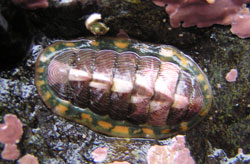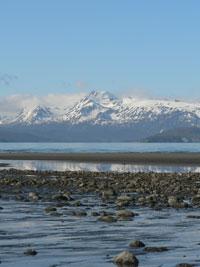Tidepooling in Alaska
Collecting and Harvesting
 The Alaska Department of Fish and Game (ADF&G) sets seasons and size limits on food harvests of seaweeds and marine invertebrates
classified as "shellfish," such as clams, crabs, snails, chitons, and octopus, and requires harvesters to obtain a
Sport Fishing License.
In addition, anyone who has a scientific or educational need to collect seaweed or marine invertebrates or fish can develop
a study plan and apply to ADF&G for an Aquatic Resource Permit. Whether you are a teacher who wants animals for classroom study, a scientist conducting research, or a collector for an educational aquarium, you need this permit.
The Alaska Department of Fish and Game (ADF&G) sets seasons and size limits on food harvests of seaweeds and marine invertebrates
classified as "shellfish," such as clams, crabs, snails, chitons, and octopus, and requires harvesters to obtain a
Sport Fishing License.
In addition, anyone who has a scientific or educational need to collect seaweed or marine invertebrates or fish can develop
a study plan and apply to ADF&G for an Aquatic Resource Permit. Whether you are a teacher who wants animals for classroom study, a scientist conducting research, or a collector for an educational aquarium, you need this permit.
Here are some tips on collecting and subsistence gathering:

- If you dig clams in a sand or mud flat, fill in the holes. By leaving large piles of mud or sand, you may suffocate small clams or other animals trapped in burrows that no longer reach the surface.
- Don't collect or disturb animals and plants in areas designated as biological preserves. Professional biologists doing research in the preserve must apply to the appropriate state or borough authorities for permission.
- If you are on a field trip, do as much studying as possible at the shore. A special permit is required to bring animals back for study or an aquarium. If you are collecting animals, keep them cool, aerated, and do not overcrowd them. It is better to transport them in a lot of water than to crowd them in too little water.
- Make use of all that you can of the animals you collect before they perish. To prevent the transmission of disease and the introduction of exotic species, returning the animals to the beach is not permitted. Do not let the collection be an end in itself.
- Obey the laws for open seasons, bag limits, and size limits. These laws were designed to protect these animals based on our knowledge of their biology.
- If you teach about marine animals and plants, teach about stewardship as well. Good stewardship and a love of nature will enrich the world we leave to the next generation.
- It's illegal to collect marine invertebrates or fish without an ADF&G Aquatic Resource Permit. The permit is free of cost. For information and to download an application, visit the Aquatic Resource Permits page or contact ADF&G for an application form at ADF&G Division of Commercial Fisheries, P.O. Box 115526, Juneau, AK 99811-5526; (907) 465-4724. To obtain a permit for amphibians or freshwater/estuarine fish/gastropods/bivalves, call the Division of Sport Fish at (907) 267-2218.
